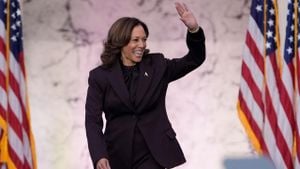Former Congressman Matt Gaetz's brief political resurrection as the Trump administration’s nominee for Attorney General has come to an abrupt end, leaving the former Florida representative reevaluated as he contemplates his political future. Just eight days after his nomination was announced by then-President-elect Donald Trump, Gaetz found himself withdrawing amid allegations and increasing scrutiny, propelling him out of one of the most significant legal offices before ever stepping foot inside it.
Gaetz was no stranger to controversy. The incendiary politician had been embroiled in multiple investigations, including allegations of sexual misconduct, most prominently the claims involving co-participants of the then-17-year-old girl and accusations tied to sex trafficking. The combination of these allegations along with Gaetz's limited legal experience became problematic when he was nominated for the role of Attorney General.
According to reports, Gaetz’s nomination spectacle revealed not only the dynamics of the incoming administration’s approach to contentious figures but also the political reality which overshadowed his push for the role. Trump’s list of cabinet nominations included other contentious figures, but none more shocking than Gaetz, whose history of grandstanding made him one of the more infamous choices. His scant legal practice following his Juris Doctor obtained back in 2007 left many scratching their heads over his readiness to lead at such a pivotal moment.
The tumultuous nomination did not fare well within the Senate, where concerns about the personal history of Gaetz heavily outweighed any support he would have received from his colleagues. After numerous senators began voicing opposition, Trump was pressured to rethink his choice. It is said he eventually told Gaetz, “I’m using a lot of my political capital,” indicating the toll Gaetz's nomination was taking on the President-elect's ability to push through the rest of his agenda.
It was not long before Gaetz withdrew himself from the process, leaving Trump with little choice but to pick Pam Bondi, former Florida Attorney General, as his new nominee for the position. This withdrawal came less than one hour after reports indicated CNN was preparing to release information on Gaetz’s alleged sexual activities, which included alarming new allegations. Despite this setback, Gauge's decision to step aside laid the groundwork for the next phase of Trump's administration.
While Bondi’s nomination is perceived as less scandalous, the political maneuvering behind the scenes paints a narrative of turmoil around Trump's cabinet choices. Many observers noted this episode as indicative of the internal conflict swirling within the Republican Party as it attempts to navigate the waters of its relationships with candidates like Gaetz versus the very real need for credibility and distance from allegations hanging over lawmakers. Political scientists are noting how this could shift Trump's strategies for future candidates as he aims to avoid or distance himself from any detrimental circumstances tied to his nominees.
Gaetz, on the other hand, finds himself on much shakier ground politically, having stepped away from Congress and now stuck without clear next steps. Political analysts have shared opinions about Gaetz's future ambitions, conjecturing whether his abrupt exit from Congress might lead him to set his eyes on the Governor’s Mansion following Governor Ron DeSantis’s term-limitation exit after the 2026 election. Speculations began circulating, with Florida State Representative Anthony Sabatini tweeting he anticipates Gaetz as the next governor, to which Gaetz responded with enthusiasm, evident by his playful gif of the Florida state flag.
Despite his resignation from Congress, Gaetz has indicated he isn't done with politics. During one of his recent podcast appearances, he remarked, “I’m still going to be in the fight, but it’s going to be from a new perch.” This signals both his intentions to remain within the political spotlight and his aim to reshape his narrative moving forward.
What remains to be seen, especially amid the legislative shift coming with the next election, is how the not-so-distant fallout of his past might affect how constituents view his bid for higher office. This comment on political capital holds weight; one can only wonder how many more hurdles remain should he pursue such aspirations. Should Gaetz successfully navigate these waters, it remains uncertain if the allegations and controversies tied to his name can be dislodged firmly enough to earn the trust of the voters at large.
With potential challenges posed on the horizon, including the scrutiny of other controversial nominees still standing, like Pete Hegseth for the Pentagon, the larger narrative reveals not only the tightrope Trump’s administration may be walking but also the precarious evolution of key figures’ political futures within the Republican framework—Gaetz included. How he manages his next steps will deeply shape not only his political identity but the strategy for the broader Camp Trump's upcoming encounters.



